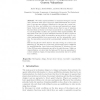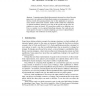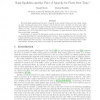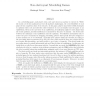87
Voted
SAGT
2009
Springer
15 years 7 months ago
2009
Springer
We study implementability in dominant strategies of social choice functions when sets of types are multi-dimensional and convex, sets of outcomes are arbitrary, valuations for outc...
82
Voted
SAGT
2009
Springer
15 years 7 months ago
2009
Springer
In this paper we study a large class of resource allocation problems with an important complication, the utilization cost of a given resource is private information of a profit ma...
102
Voted
SAGT
2009
Springer
15 years 7 months ago
2009
Springer
Computing optimal Stackelberg strategies in general two-player Bayesian games (not to be confused with Stackelberg strategies in routing games) is a topic that has recently been ga...
145
Voted
SAGT
2009
Springer
15 years 7 months ago
2009
Springer
85
Voted
SAGT
2009
Springer
15 years 7 months ago
2009
Springer
We study economic means to improve network performance in the well-known game theoretic traffic model due to Wardrop. We introduce two sorts of spam flow - auxiliary and adversari...
118
click to vote
SAGT
2009
Springer
15 years 7 months ago
2009
Springer
We consider the loss in social welfare caused by individual rationality in matching scenarios. We give both theoretical and experimental results comparing stable matchings with soc...
109
Voted
SAGT
2009
Springer
15 years 7 months ago
2009
Springer
Congestion games—in which players strategically choose from a set of “resources” and derive utilities that depend on the congestion on each resource— are important in a wid...
SAGT
2009
Springer
15 years 7 months ago
2009
Springer
We study Nash equilibria and the price of anarchy in the context of flows over time. Many results on static routing games have been obtained over the last ten years. In flows ov...
105
Voted
SAGT
2009
Springer
15 years 7 months ago
2009
Springer
In a scheduling game, each player owns a job and chooses a machine to execute it. While the social cost is the maximal load over all machines (makespan), the cost (disutility) of ...
SAGT
2009
Springer
15 years 7 months ago
2009
Springer
We study the survivable version of the game theoretic network formation model known as the Connection Game, originally introduced in [5]. In this model, players attempt to connect ...




